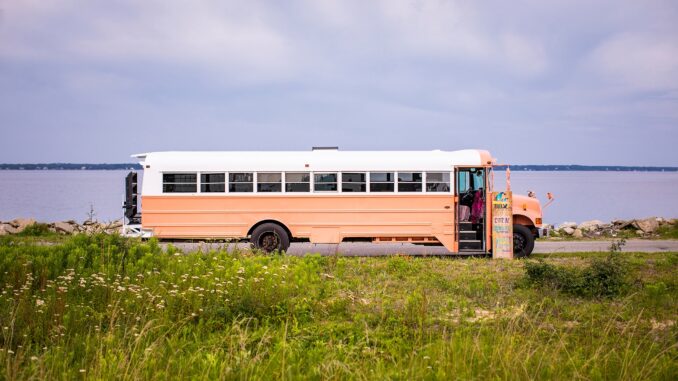
We all know small business owners whose livelihoods were disrupted, if not destroyed, by the pandemic. Ami Hill, owner of Muse Gallery OBX, a brick-and-mortar art gallery featuring local artists and artisans, was not spared. However, she was also not deterred.
Successful entrepreneurs have a way of forging a path where none is obvious. Ami didn’t give up on her gallery; she found another way to make it happen.
She purchased an old school bus, ripped out the seats, painted it coral, and turned it into a mobile art gallery. She christened it “#Bus252”, the number on the side of the bus when she bought it. In addition to the locals whose work was featured on #Bus252, Ami invited other artists to set up around #Bus252 as part of an artist market. This allowed her to expose the OBX community to even more creativity in their midst.
Turns out, her hometown of Kill Devil Hills was not too keen on this. By ordinance, KDH has established an unduly restrictive scheme that makes it all but impossible for its itinerant vendors to make a living.
Now Ami has filed suit challenging the law.
By default, itinerant vendors are banned and may only operate under a “Special Event” permit, either Charitable or Non-Charitable. A Charitable permit requires all vendors to donate 100 percent of their proceeds to a charity in exchange for the right to sell year-round. Otherwise, they cannot operate for five months out of the year, May through September, the town’s busiest season. These options obviously make it hard to run a successful business.
Itinerant vendors can always apply for a Non-Charitable Special Event permit from the Board of Commissioners, but the Board has unbridled discretion to decide whether to grant or deny the request.
In Ami’s case, the town cut off both avenues to a Special Event permit, preventing her from making a living in town this summer. When the Board recently denied her request to set up her pop-up artist market, they claimed that there was no real “event” other than artists selling their work and that this did not rise to the level of “for the good of the community.” Tell that to the countless artists featured at Ami’s markets and the customers who support their work.
Meanwhile, the town has recently established its own local artist market that directly competes with Ami. The only difference is that these First Flight Market vendors are exempt from the ordinance’s restrictions.
What does the town have against itinerant vendors? It claims it needs to protect its brick-and-mortar businesses from competition. But as Ami says, “#Bus252 *is* my bricks-and-mortar.”
Itinerant vendors are not fly-by-night snake oil salesmen roaming from town-to-town defrauding hapless citizens. (You’re probably thinking of peddlers and hawkers of yore.) Instead, these enterprising individuals are artists and artisans, local farmers, food truck chefs, and even those cute kids at the corner trying to sell you lemonade. They ― or, in the case of the lemonade sellers, their parents ― are tax-paying members of the community who earn income without the high overhead of a bricks-and-mortar building. In Ami’s case, far from threatening brick-and-mortar businesses, she is regularly invited onto their private property to set up her bus and her market. It should be a win-win situation, but the town has taken it upon itself to pick the winners and losers.
Fortunately, the North Carolina constitution explicitly protects its citizens’ right to earn an honest living free from unnecessary government interference. North Carolina is the only state in the nation whose constitution contains a “Fruits of Their Own Labor” clause, a fact all North Carolinians should celebrate. In filing suit, Ami has taken the wheel to vindicate the rights of Kill Devil Hills itinerant vendors to keep the fruits of their labor. She’s determined not to let the town throw those rights under the bus.
Donna G. Matias is an attorney at Pacific Legal Foundation, a nonprofit legal organization that defends Americans’ liberties when threatened by government overreach and abuse.
